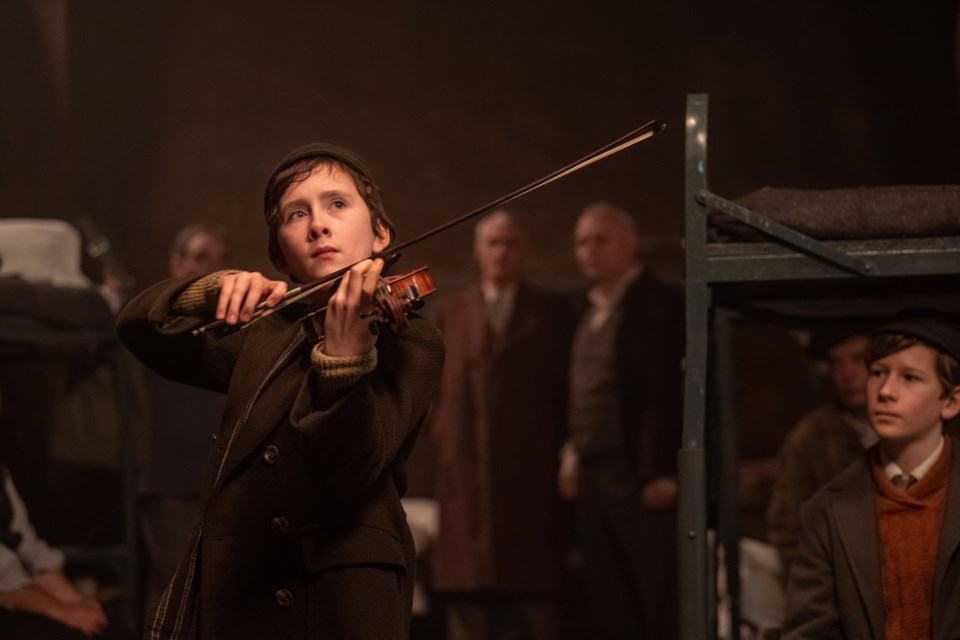REVIEW
The Song of Names
Stars: 4.5
Starring Tim Roth, Clive Owen, Catherine McCormack, Gerran Howell, Misha Handley, Jonah Hauer-King, Luke Doyle, Marina Hambro, Saul Rubinek, and Eddie Izzard
Directed by François Girard
Written by Jeffrey Caine
Rated: PG for violence, coarse language, brief nudity, and substance use
Runtime: 114 minutes
New on iTunes and across all digital platforms, as well as DVD
A young violin virtuoso disappears just before his début on a grand London stage. It’s a monumental upset on many levels, not the least of which is suffered by the performance art world.
He is missed by his adoptive family, the Simmonds, who fostered him and his talents since he was a child. Dovidl Rapoport’s Polish Jewish parents brought him to England to help develop his musical talents. But that was in the late 1930s, right before WWII. Dovidl lost his parents in the ensuing years, remaining with the Simmonds who have a son Martin who is the same age.
Martin and Dovidl become close, but when the 21-year-old Dovidl disappears, it ruins Martin’s family and leaves a gaping hole of unanswered questions, a relationship broken off inexplicably. As it turns out, their story is more about memory and trauma, a legacy of pain, and paying tribute to the past.
The Song of Names, Montreal director François Girard’s new film based on the novel by Norman Lebrecht, is just about as emotional and beautiful as it could get. Keep in mind that it’s not just about the music either, though one couldn’t possibly forget he was also responsible for Thirty Two Short Films About Glenn Gould and The Red Violin. Music might be an unmistakeably common theme in his filmography, but here it’s more of a motif. The story is all, though one cannot help but praise the original score by composer Howard Shore with solo violinist Ray Chen doing the handiwork represented by Dovidl during his various performances on screen.
It plays out like a treasure hunt where a relationship is the golden idol hidden deep within the dark well of history. The plot plays out during three periods of Dovidl and Martin’s lives – when they are 9, 21, and in their 50s – which gives us three perspectives on the depth of their relationship and the work they do to reconcile the irreconciliable. It's the strength of the performances and the three pairings that really builds the movie. It drags on at times, admittedly, but investing emotionally in the characters is a saving grace for viewers.
RELATED: Directing rhythms is François Girard's method
It’s a marvel of storytelling with Tim Roth and Clive Owen taking the older roles with enough somberness and gravitas though the elder Dovidl doesn’t much appear until Martin’s detectivery discovers all of the clues and retraces all of his brother’s steps. Finding out the answer ‘why’ is a lifelong and nearly ruinous obsession for Roth’s Martin and we see it on his face. The plot takes us to former extermination camp Treblinka marking this the first film ever to trod that troubled ground.
This weekend, the film was originally meant to stand up for nine nominations during the Canadian Screen Awards ceremony. The Academy has advised the media that the winners will still be announced somehow and sometime although the details have not yet been confirmed.
It would have undoubtedly been lovely to see it receive its accolades on stage, just as it would have been to see Dovidl during that scheduled performance that occurs so early on in The Song of Names. Perhaps we may all better appreciate the devastation of the Holocaust for the circumstances that have been imposed on all of us now.




